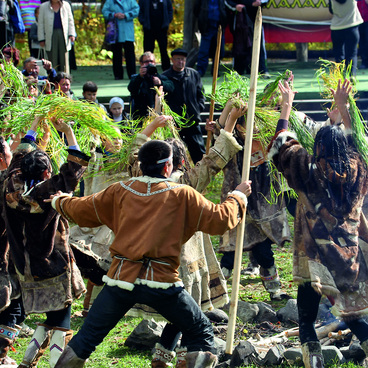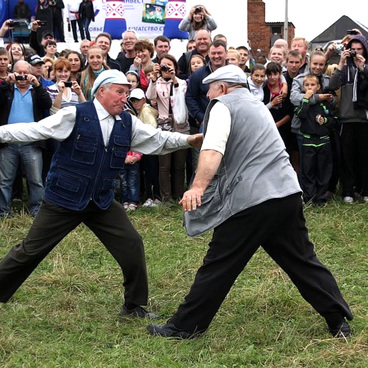Every year in September, the Udege people celebrate Sagdi Dava near the Olga settlement. The name of the holiday can be translated as “Big fish”.
The Udege mostly believe in animism and shamanism. The spirit called Mamasa davani, the mistress of salmon, is particularly important. The Sagdi Dava celebrates the beginning of the chum salmon fishing season.
There is an Udege legend about those who treated fish with disrespect, “…The mistress of salmon Mamasa davani was kind <…> There were so many fish that people forgot the rules: they caught the fish, cut meat from the sides and threw the rest back in the water. <…> The mistress felt quite bitter about the rules being broken. The next year there was no chum salmon. People were in great distress, they had nothing to eat. In the end, they all died”.
The Udege used to have a ritual before the salmon run. They pitched a stake to function as a sacrificial altar into the sandbank. A flat stone representing a table was put on top. On the stone, some fat, a piece of flatbread, tobacco and matches were placed as an offering to spirits. After two or three days, people could start fishing. Letting wounded fish back in the water, eating the head, or throwing fish away was forbidden: the Udege believed that once these rules were broken, the good spirits would stop protecting them.
Nowadays, during the festivities, shamans conjure fish and summon spirits of water. They remind people of taking only as much food as necessary. After that, men throw spears, shoot a bow and jump over sleds to compete in strength and dexterity and show that they are healthy and strong enough to catch chum salmon.
The Udege mostly believe in animism and shamanism. The spirit called Mamasa davani, the mistress of salmon, is particularly important. The Sagdi Dava celebrates the beginning of the chum salmon fishing season.
There is an Udege legend about those who treated fish with disrespect, “…The mistress of salmon Mamasa davani was kind <…> There were so many fish that people forgot the rules: they caught the fish, cut meat from the sides and threw the rest back in the water. <…> The mistress felt quite bitter about the rules being broken. The next year there was no chum salmon. People were in great distress, they had nothing to eat. In the end, they all died”.
The Udege used to have a ritual before the salmon run. They pitched a stake to function as a sacrificial altar into the sandbank. A flat stone representing a table was put on top. On the stone, some fat, a piece of flatbread, tobacco and matches were placed as an offering to spirits. After two or three days, people could start fishing. Letting wounded fish back in the water, eating the head, or throwing fish away was forbidden: the Udege believed that once these rules were broken, the good spirits would stop protecting them.
Nowadays, during the festivities, shamans conjure fish and summon spirits of water. They remind people of taking only as much food as necessary. After that, men throw spears, shoot a bow and jump over sleds to compete in strength and dexterity and show that they are healthy and strong enough to catch chum salmon.


